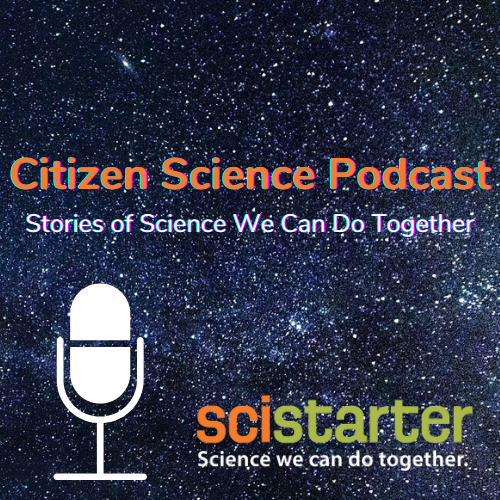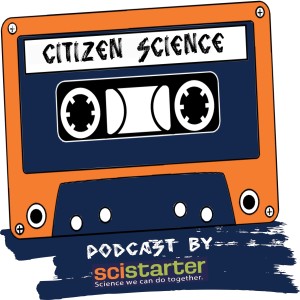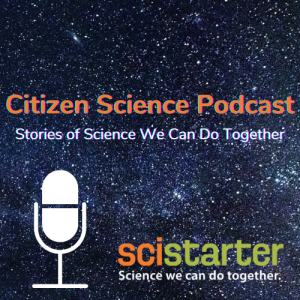
23K
Downloads
62
Episodes
Citizen Science, a podcast from SciStarter, spotlights the many ways communities are exploring and changing the world around them through public participation in science.
Citizen Science, a podcast from SciStarter, spotlights the many ways communities are exploring and changing the world around them through public participation in science.
Episodes

Friday Jan 24, 2020
Citizen Science at North Carolina State University
Friday Jan 24, 2020
Friday Jan 24, 2020

Friday Nov 22, 2019
Cultural Heritage Institutions and Citizen Science - Part 1
Friday Nov 22, 2019
Friday Nov 22, 2019
Resources for Natural History Museums
Natural History Museum of Los Angeles County - Community Science
https://nhm.org/community-science-nhm
NHM Community Science Projects
Resources for Libraries
SciStarter IMLS Grant: Libraries as Community Hubs for Citizen Science
Librarian's Guide to Citizen Science
Maricopa County Library System
Maricopa County Citizen Science Webinar
Arizona State University Library Guide on Citizen Science
GLOBE - SMAP (Soil Moisture Active Passive)
Measuring Light in the Night Kit

Tuesday Oct 08, 2019
iNaturalist and Appalachian Mountain Club
Tuesday Oct 08, 2019
Tuesday Oct 08, 2019
iNaturalist allows anyone, anywhere to contribute to a global record of biodiversity by uploading pictures of plants and animals with their smartphone or computer. In this episode, co-host Justin Schell talks with Dr. Carrie Seltzer, the Stakeholder Engagement Strategist for iNaturalist, about how the platform works, the iNaturalist community, and how iNaturalist advances scientific research. Featured in this episode is the Appalachian Mountain Club (AMC), the oldest outdoor group in the United States. The AMC runs multiple citizen science projects, and in this episode, Georgia Murray, a staff scientist at AMC; Annie Evankow, a Research Assistant with AMC; and Alina Michelewicz, a volunteer with a number of AMC projects speak about their citizen science work with iNaturalist — how they have been able to supplement the core data fields on iNaturalist with some specific to their project, as well as how they have approached citizen science and research with the Northeast Alpine Flower Watch project. Music for this episode is from MWD, used under a Creative Commons license from the Free Music Archive. Special thanks to Jill Nugent for conducting the interview with the AMC team. A transcript is available here.
For those of you who have accounts on SciStarter, add your iNaturalist username to your SciStarter dashboard, and you’ll get credit for your contributions.
Links:

Wednesday Sep 25, 2019
Minisode - Smart Recommendations in SciStarter
Wednesday Sep 25, 2019
Wednesday Sep 25, 2019
With thousands of projects listed on SciStarter, a main challenge can be finding the right project, one that really suits your needs and your interests. After meeting at workshop on the Open Science of Learning hosting by the Center for Research and Interdisciplinarity, Kobi Gal, a leading expert in human-centered artificial intelligence, and Darlene Cavalier, the founder of SciStarter, collaborated, with support from NESTA, a UK-based innovation foundation, to create a smart recommendation system to help SciStarter users find the right project. Kobi and Na'ama Dayan, another team member working on this project, sit down with Caroline Nickerson from the SciStarter team to talk about the new system and how YOU can help us test it. A transcript is available here. Music in this episode is by Discount Fireworks, used under a Creative Commons license via the Free Music Archive.

Sunday Aug 25, 2019
COASST
Sunday Aug 25, 2019
Sunday Aug 25, 2019
The Coastal Observation and Seabird Survey Team (or COASST, for short) project is a network of citizen scientists that monitor marine resources and ecosystem health at over 400 beaches across northern California, Oregon, Washington, and Alaska. COASST works to translate long-term monitoring into effective marine conservation solutions. Co-host Caroline Nickerson chats with Dee Richie, a citizen scientist who volunteers with COASST, and Hillary Burgess, the science coordinator for COASST, about how to get involved with COASST and citizen science focused on marine ecosystem health. A transcript can be accessed here.
Other resources mentioned in this episode:

Monday Jul 29, 2019
Community Snow Observations
Monday Jul 29, 2019
Monday Jul 29, 2019
NASA-funded Community Snow Observations (CSO) project recruits citizen scientists to help collect snow depth observations – anytime and anywhere, and then they can submit their observations via the mobile-sharing platform Mountain Hub. Co-host Caroline Nickerson chats with one of the project leaders, David Hill, and one of CSO’s volunteers, Katie O’Connell, talk about the importance of collecting snow depth data around the world--how that informs both local knowledge of things like avalanches and water availability, to how data contributed by everyday hikers can better inform global models of snow availability and its relationship to the water cycle. You can find a transcript here.

Monday Jul 01, 2019
EarthEcho Water Challenge
Monday Jul 01, 2019
Monday Jul 01, 2019
This episode spotlights EarthEcho International and one of the organization’s signature programs, the EarthEcho Water Challenge. Kicking off in March each year on World Water Day, EarthEcho encourages participation in the Water Challenge year-round. Founded by the grandchildren of ocean explorer Jacques Cousteau, EarthEcho's mission is to inspire young people throughout the world to take action for a more sustainable future. Caroline Nickerson talks with Sean Russel, the Manager for EarthEcho's Water Challenge program, and Katelyn Higgins, a student leader in EarthEcho and member of the group's Youth Leadership Council. They discuss what it means to incorporate youth voices at every level of the organization, how to explain water chemistry to kids, how water monitoring can turn into water action, and how you can get involved in the science to better understand and protect the waters where you live. A transcript is available here.

Wednesday Jun 05, 2019
Curio
Wednesday Jun 05, 2019
Wednesday Jun 05, 2019
This episode is all about trees and how users of the Curio can map and monitor urban and community trees globally. Terrence Pickles is the founder of Exeter Trees, which attempts to document and preserve every tree in Exeter, in the UK, using both YouTube and the Curio app, which was developed by our second guest, Paul Hickey. Co-host Caroline Nickerson talks to Terrence and Paul about their motivations for doing the work they do, the kinds of results they’ve had so far, and how you can get started using Curio to better see and understand the whole of the world, or at least the trees you walk by every day. A transcript can be accessed here.

Wednesday May 15, 2019
ISeeChange
Wednesday May 15, 2019
Wednesday May 15, 2019
This episode features a conversation between Samantha Harrington, ISeeChange's Digital Community Manager, and Amber Kleinman, a volunteer who uses ISeeChange to document weather events in Paonia, a small town in western Colorado. ISeeChange is a platform to help users and their communities document weather in their own backyards, bringing greater visibility to effects of climate change through multimedia storytelling. Samantha and Amber chat with Caroline, Citizen Science's co-host, about how they got started with ISeeChange, the work that they do, and their recommendations for others to get started documenting changes in weather and climate. A transcript can be accessed here.

Tuesday Apr 30, 2019
Reef Life Survey and GBIF
Tuesday Apr 30, 2019
Tuesday Apr 30, 2019
This episode features a conversation between Kyle Copas, Communications Manager at the Global Biodiversity Information Facility, which is known as GBIF, and John Turnbull, the Sydney, Australian coordinator for Reef Life Survey. The focus of this conversation is citizen science data: how it’s collected, what happens to it, and what is the process from collection by citizen scientists to the transformation and processing that brings the data into GBIF’s index. A transcript can be accessed here.
